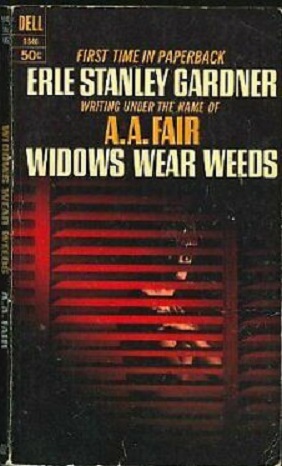Book Review: Widows Wear Weeds by A.A. Fair (Erle Stanley Gardner)
Erle Stanley Gardner became famous thanks to his Perry Mason stories, featuring a defense attorney whose client is always innocent (of the particular murder the story is about.) But not every one of his story ideas fit that mold, so under the pen name of A.A. Fair, Mr. Gardner also wrote the Cool and Lam series. Bertha Cool and Donald Lam are partners in a detective agency. Bertha’s got a mind for business and keeps them in the black, and Donald does the actual leg work and most of the deducing. (They have other operatives, but they’re not important to this story.)

In this case, a restaurant owner who’s being blackmailed insists on paying off, but retains Lam and Cool to make sure this will be the only payment. Donald smells something off about the deal, so takes some precautions. All seems to go well, but the free meal the restauranteur provides goes sour when the blackmailer turns up dead in a nearby booth. Donald’s caught between lying to protect a police officer who was with them at the time, or being framed for murder!
This particular book was published in 1966, and is late in the series. By this time, the detective firm is well established, and it’s easy to find out, for example, which police officers they hang out with. Sergeant Frank Sellers is frenemies with Donald; Don keeps giving him wrapped up cases, but makes the police officer feel stupid and suspicious. In this case, he has to find some way to keep the fact that he was drinking at dinner from becoming known, so he wants Donald to cover for him–or else.
Mention is made of then recent Supreme Court decisions making it harder for police to trample over the rights of suspects. Sellers is against these, and is the old-fashioned sort of cop who indulges in a little light brutality when he thinks he can get away with it. Donald’s smarter, and knows how to get around the new rules.
The plot itself is the usual twisty affair. People are lying because they’ve committed crimes, or to protect people who they think have committed crimes, or because the truth is embarrassing. Donald has to sort out this web of lies while staying out of jail, and of course enjoying the company of attractive women. Can he serve the interests of his client while seeing that justice is done, and precisely who is the actual client?
Bertha plays very little part this time as Donald has to avoid her to achieve part of his goals, but does get to show off her combat chops towards the end.
The action here is very much of its time, so would be best appreciated by those who’ve studied a bit about the social changes that happened in the 1960s in America and understand how that affects the character’s actions and attitudes. (Also, for our younger readers, it used to be the fashion for widows to wear black dresses of a certain sort, which were called “weeds.”)
Recommended to Erle Stanley Gardner fans.

